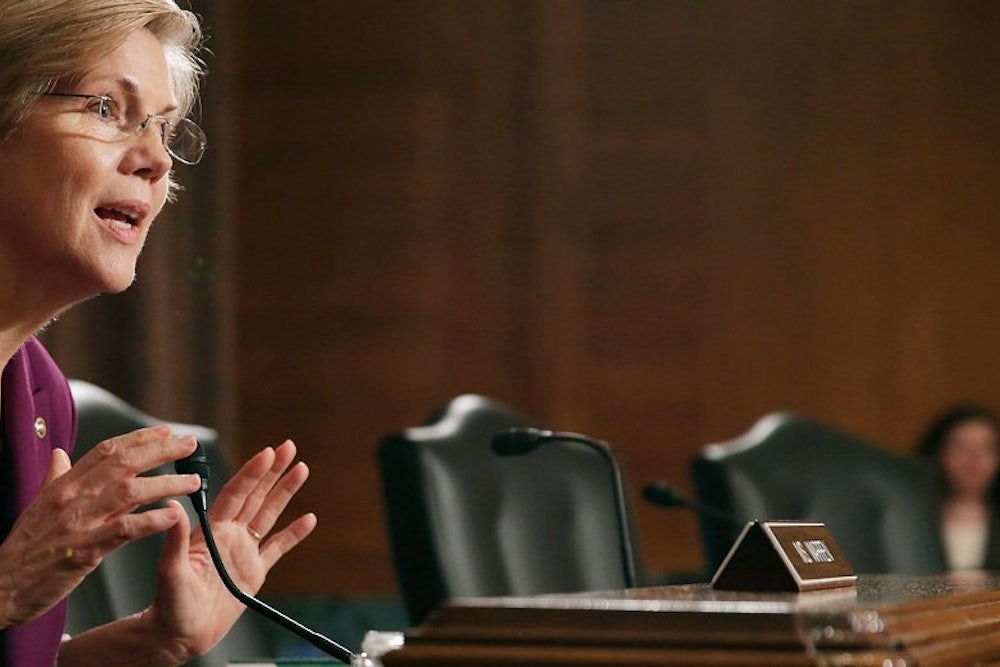When Congress passed legislation in December to fund most of the government through the remainder of the fiscal year, Senator Elizabeth Warren and liberal Democrats nearly killed the bill over a policy rider that rolled back a piece of the Dodd-Frank financial regulatory bill. It was a sign, they warned, of what’s to come.
Just a few days into the 114th Congress, those warnings are proving prescient. On Thursday afternoon, the Senate overwhelmingly passed legislation to renew the Terrorism Risk Insurance Act (TRIA), which expired at the end of 2014 and allows the federal government to backstop commercial insurance companies up to $200 million in the case of a terrorist attack. But the bill, which the House passed on Wednesday, also eliminates another provision in the financial regulatory bill. Wall Street’s strategy to dismantle Dodd-Frank is only picking up speed.
The regulation that TRIA rolls back is not pivotal to Dodd-Frank. It gives the Securities and Exchange Commission (SEC) and Commodities Future Trading Commission (CFTC) oversight over collateral and margin requirements for certain financial trades—known as derivatives—with commercial end users. It’s not as important to Dodd-Frank as Section 716, which prevented banks from using taxpayer-backed money to trade in certain high risk financial products and was eliminated in the year-end funding bill known as the CROmnibus. But it still weakens the law. “The oversight of margin and collateral for derivatives transactions is a basic regulatory safeguard,” Americans for Financial Reform wrote in an open letter opposing the provision. “Even though regulators have not proposed to require any margin of commercial end users at this time, it is inappropriate to completely eliminate the ability of central derivatives market regulators to take action in this important area.”
The regulation has nothing to do with terrorism risk insurance; it was slipped into the bill so that it would pass without much fanfare. New York Senator Chuck Schumer, who has been one of the leading advocates for TRIA, called the provision “a pound of flesh in a must-pass piece of legislation.” In other words, it’s not a good change but it’s the price liberals must pay to pass TRIA.
Contra Schumer’s words, though, Democrats could have demanded that Republicans removed the provision from the legislation. Warren offered an amendment to do just that but it failed by a 66-31 vote. Warren and Senator Maria Cantwell were the only two Democratic senators to oppose the bill. (Independent Bernie Sanders and Republican Marco Rubio also voted against it.) In the House, TRIA passed by a 415-5 vote.
In some ways, this change to Dodd-Frank actually has more dire implications for the future of the law than the roll back of Section 716 in the CRomnibus. Budget bills often contain an array of different policy riders. That’s certainly not a good way to make policy but it’s not uncommon either. Few congressman are willing to shut down the government over small, or even not-so-small, policy changes. It’s a backdoor way to enact policy changes
Wall Street used the same strategy with TRIA. Its expiration at the end of 2014 has worried many insurance companies, particularly in big cities like New York City. “Within days, about 750,000 private insurance policies were canceled, following clauses that said they could exist only if the federal government were prepared to shoulder some of the costs in the event of a catastrophic attack,” Jonathan Weisman reported in the New York Times. The only reason it expired at all was because former Senator Tom Coburn blocked the bill at the end of the 113th Congress. It then became a top priority for the 114th Congress—and Wall Street jumped on that opportunity.
Of course, Democrats could have sent a message by blocking the legislation altogether until the Dodd-Frank provision was removed. President Barack Obama could still send that message if he refused to sign it. Congress easily has the votes to override the veto, of course, but Obama would at least reassure liberals that he will not just allow Wall Street to chip away at the law bit by bit.
But that doesn’t appear likely to happen. Instead, Democrats overwhelmingly voted in favor of it and could only muster 31 votes in the Senate to remove the provision. If that’s the amount of effort Democrats are going to invest to uphold Dodd-Frank, it’s an ominous sign for the future of the law.
